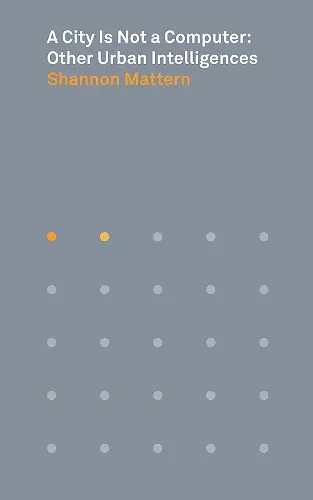A City Is Not a Computer
Other Urban Intelligences
Format:Paperback
Publisher:Princeton University Press
Published:14th Sep '21
Should be back in stock very soon

A bold reassessment of "smart cities" that reveals what is lost when we conceive of our urban spaces as computers
Computational models of urbanism—smart cities that use data-driven planning and algorithmic administration—promise to deliver new urban efficiencies and conveniences. Yet these models limit our understanding of what we can know about a city. A City Is Not a Computer reveals how cities encompass myriad forms of local and indigenous intelligences and knowledge institutions, arguing that these resources are a vital supplement and corrective to increasingly prevalent algorithmic models.
Shannon Mattern begins by examining the ethical and ontological implications of urban technologies and computational models, discussing how they shape and in many cases profoundly limit our engagement with cities. She looks at the methods and underlying assumptions of data-driven urbanism, and demonstrates how the "city-as-computer" metaphor, which undergirds much of today's urban policy and design, reduces place-based knowledge to information processing. Mattern then imagines how we might sustain institutions and infrastructures that constitute more diverse, open, inclusive urban forms. She shows how the public library functions as a steward of urban intelligence, and describes the scales of upkeep needed to sustain a city's many moving parts, from spinning hard drives to bridge repairs.
Incorporating insights from urban studies, data science, and media and information studies, A City Is Not a Computer offers a visionary new approach to urban planning and design.
"Shannon Mattern’s new book A City Is Not a Computer holds an important caveat: A city isn’t just a computer. While artists and urbanists have sought to describe it in its messy totality, an oversimplified logic that has reduced urban reality to singular narratives. . .blinds us to its ‘prismatic complexity’. . . . A City Is Not a Computer is, most fundamentally, a push to “inject history and happenstance” into our appreciation of urban life, and a reminder to respect the impossibility of summarizing our messy cities with neat, tidy narratives."---Annie Howard, Metropolis
"A City is Not a Computer digs into the data, dashboards, and language that keep people from building better, safer communities. . . . The book reflects the ways a bunch of academic disciplines refract the idea of urbanism, of how to make a city that supports everyone who lives there. . . . Mattern’s deft dissection of metaphors for cities shows that when they’re misguided, they point to a failure not only of imagination but of a city’s ability to carry out its chief function—as a bulwark against disaster."---Adam Rogers, Wired
"
A powerful perspective on types of intelligence that technocratic visions of smart cities unduly diminish.
"---Evan Selinger, Los Angeles Review of Books"A City Is Not A Computer puts forth a much needed, audacious argument about the limitations of data-driven, computational thinking currently supported by countless municipalities and ‘smart city’ advocates. Accessible and provocative, Mattern is at her best, succinctly weaving constructively critical insights with wide ranging examples towards an urbanism of wisdom that tempers its focus on efficiencies with environmental justice, social sensitivity, and indigenous knowledge. Truer words have not been spoken when she describes such a city being ‘smarter than any supercomputer.’"---Erick Villagomez, Spacing Canada
"A City is Not a Computer by Shannon Mattern is a compact little book that packs a punch when you open its pages. From its eye-catching design to how easy it is to cart around with you, this book is a subtle winner to add to your collection and your scope of knowledge. . . . Overall, this book is an incredible analysis of cities and the lives that influence them, and what should be done when designing and building a city. . . .I highly recommend you pick this book up, whether you wish to further your anthropological knowledge of cities and the lives of urban people in the West or whether you simply wish to think a little bit about how cities and lives interact."---Jenna Collingnon, Western Exteriors
"Hard to put down."---John Hill, A Daily Dose of Architecture Books
"A forceful, frequently pointed, and intellectually dense critique of the smart city “orthodoxy” and the ways in which overreliance on technology and computational models “shape, and in many cases profoundly limit, our understanding of and engagement with our cities."---Ray Bert, Civil Engineering Magazine
"A bold and inspiring thinker, Mattern is hardly reserved about being done with the orthodox concept of smartness in cities (digital technologies and resulting data) as she shifts her focus to other kinds of urban intelligence. . . . A City is Not a Computer is dense with insight on healing fractures of urban violence with plural knowledge, but Mattern’s ability with words makes for an effortless read. . . . The book leaves the reader pondering: how do we live justly, oppose colonial and capitalist tendencies, and awaken others to plural knowledge that empowers thinking with marginalised human and nonhuman communities in more attuned and less calculated ways than what smart cities allow us?"---Hira Skeikh, AI & Society
"This book is important for urban designers and city managers. . . . [A] readable, compact volume." * Choice *
"A useful window into a discussion of cities and urban planning. . . . Perhaps it is time to think about expanding planning to learn from the emerging interdisciplinary fields Mattern highlights. And, of course, these fields could perhaps learn something about cities from planning."---Jennifer Clark, Journal of the American Planning Association
ISBN: 9780691208053
Dimensions: unknown
Weight: unknown
200 pages